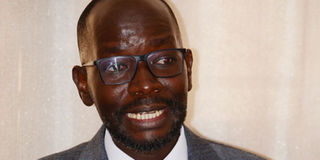Pandemic response: Sport must not be treated casually

Minister Obua broke many hearts when he said the sport’s return date remains unknown.
PHOTO BY ISMAIL KEZAALA
“Sports is a leisure economy and it can wait until the pandemic is under control.” That was the message delivered by President Museveni in an interview with NBS TV. The message - for the most part - does not expose a terrifying lack of competence.
The transmission of Covid-19 is known to be efficient in crowded and enclosed spaces. Such spaces have long been a sustainable financial model for many sporting disciplines. Physical distancing norms brought on by the pandemic were always going to have a damaging effect on sport.
The need for people to keep two metres apart is such an intractable problem not just for competitors in contact sports but also spectators. There is of course the possibility of sporting events being staged behind closed doors. But before such a conversation can take centre-stage, adequate testing and tracing capacity must be proven. This needs money, which appears to be in scanty supply.
War chest
The battle against Covid-19 has forced government to put together a war chest. This has translated into budgetary cuts for various sectors in the next financial year amounting to Shs402b. The sports sub-sector has not been spared.
It is looking rather vacantly at a Shs8b cut. Sports minister Hamson Denis Obua has rightly described the cuts as a serious impediment. They will surely inflict appalling harm as sport labours mightily to smart from the coronavirus pandemic.
The promise to make the sports sub-sector a beneficiary from any supplementary expenditure will end, as it so often does, on a dispiriting note. It is after all nothing more than a “leisure economy.” This is not a time for comfort!
Obua - who it must be admitted came to his leadership not through swaggering certainty, but by learning to follow - will not dispute Museveni’s “leisure” characterisation. Never mind that it suggests a startling level of disdain for the sub-sector. The sports minister told sports federation heads this past week that the “suspension on sports activities will be lifted when Uganda contains the Covid-19 pandemic.”
There was a time when it looked like Uganda’s Covid-19 curve was levelling off. That was before cross-border cargo truck drivers happened. It now feels as if we are in the early chapters of our Covid-19 story. The Covid-19 threat is yet to plateau out.
But then again the World Health Organisation (WHO) says Covid-19 - much like the seasonal flu - could well be an endemic virus that may never cease to exist.
Since a silver bullet solution may never blip on the radar, it is imperative that expectations be managed. Careful not to seed a laidback approach to social distancing and indeed other public health measures, WHO has asked governments to make mental health support integral to the pandemic response.
Isolation, fear, uncertainty and economic turmoil are already weighing heavily on people that — certainly in the case of Uganda — continue being cooped up. This is where sport can prove to be of great utility.
Indeed, sport in its varying nature (spectator watching on TV and participant pushing the envelope while adhering to public health measures) can be therapeutic in the sense that it offers, anticipates and encourages emotional release. This can act as a bulwark against the psychological distress that restrictive measures have inadvertently created.
Counter productive
If Covid-19 is here to stay, and we have to learn to live with it, then Obua will have to re-examine what he told sports federation heads this past week. Going by the sports minister’s assertion, the sub-sector could well have the brakes slammed on until the chickens come home to roost. Evidence is however mounting that this may prove counterproductive. A phased return to the mainstream would doubtless be prudent.
As this column proffered last Sunday, decoupling sport is a good starting point. Non-contact sports should not be viewed through the same prism as their contact cousins. Rather than present a blanket moratorium, Obua should articulate a roadmap for the gradual return of the distinct variants of sport.
What we now know...
We now know that Philip Wokorach will play in the third tier (Fédérale 1) of French club rugby.
The 26-year-old’s sparkling performances for Bourges XV did not go unnoticed. This we know for sure! We know that Wokorach — in his debut season — helped Bourges gain promotion to the fourth tier (Fédérale 2) with an unblemished record.
The full-back will now turn out for Avenir Sportif Bédarrides-Chateuneuf du Pape in the 2020/21 season. The third tier club better known by its ASBC acronym has been in existence since 1923.




